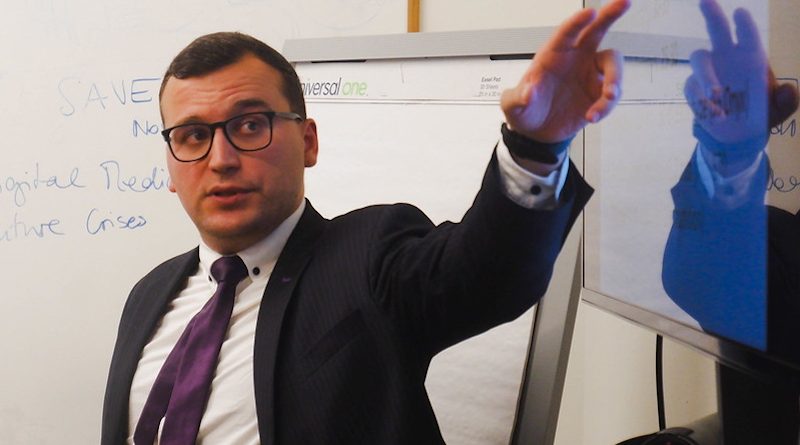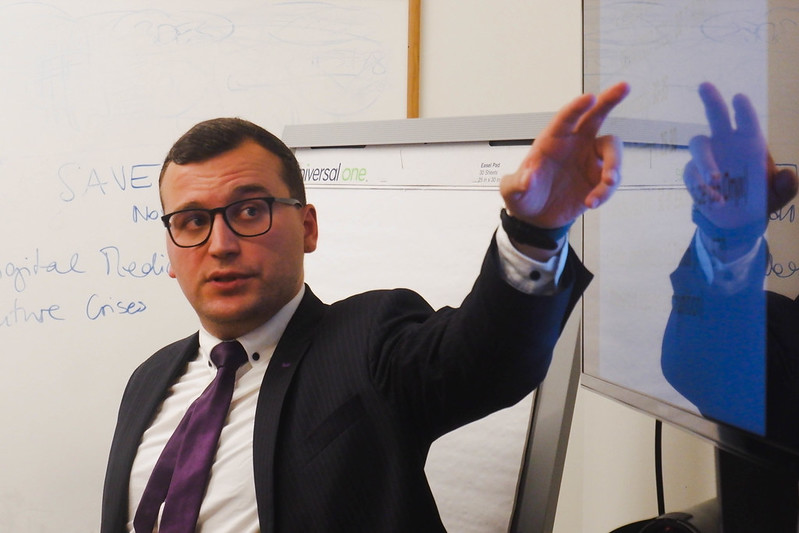Fall 2022 Fletcher Eurasia Club Lunch Seminars, Part 1
By Vishal Manve, MALD 2023 Candidate, The Fletcher School
The Fletcher Eurasia Club organized five lunch seminars with visiting scholars Andrey Todorov, Pavel Luzin, and Yury Nadtochey, as well as Professor Daniel Drezner and Russian expert Irina Busygina throughout the first half of the Fall 2022 semester. Moderated by Eurasia Club leader Alexander Thomas (F23), they provided Fletcher and Tufts students an avenue to engage with Eurasian experts on topics related to the defense industry, cultural diplomacy, soft power, geopolitics, and nuclear power.
Pavel Luzin kickstarted the first session in the Eurasia Club luncheon series on September 20, 2022. Luzin presented a report on Russia’s defense industry, growth, and trends amid the ongoing war in Ukraine. He is an expert on the Russian Armed Forces and regularly contributes to the Jamestown Foundation, Riddle, and the Foreign Policy Research Institute think tanks.
Luzin highlighted how the Russian defense industry faces “complete economic inefficiency” because of the usage of a common administrative model instead of the market model. He further stated how Russia is facing a huge demographic divide.
“Sixty-two million Russians are older than 55, and 60 million Russians are between 18 and 55 years of age. Generations are small, and the workforce is decreasing,” Luzin said in the backdrop of Russian President Vladimir Putin’s calls for partial mobilization in September.
On the potential of Russia using nuclear weapons, he added, “Nuclear weapons [are] a political issue for Russia, and nuclear parity is a matter of politics for Russia’s great power status.”
“It is not based on economic or defense interests. Russians are obsessed with the idea of parity with the U.S.,” Luzin concluded.
The next Eurasia Club luncheon featured Yury Nadtochey on September 27, 2022, and focused on ways to manage escalation risks between Russia and the West.
Nadtochey specializes in transatlantic relations and European security and focuses on the Russia-NATO relationship amid the Russia-Ukraine war.
Explaining the need for confidence-building measures to manage conflict, Nadtochey stressed ways to tackle information asymmetry and the basis for decision-making, emphasizing that the focus should be “on social norms and not just benefits-costs analysis.”
Offering insights into Russia’s geopolitical approach, Nadtochey said, “There is a strong belief in the Kremlin that we are dealing with dwarfs [a reference to Eastern European countries] or middle economies, and the focus is only on the U.S.”
“Strategic cooperation between Russia and NATO is impossible. But possible cooperation to prevent war is important to overcome the most severe consequences,” Nadtochey added.
The next session was with Irina Busygina on October 4, 2022. She is a visiting scholar at the Harvard Davis Center for Russian and Eurasian Studies and an independent researcher. At the luncheon, Busygina discussed the impact of the Russia-Ukraine war on the post-Soviet space, including protracted armed conflicts across the South Caucasus, Central Asia, and Eastern Europe.
Outlining Russia’s post-Soviet diplomacy in the region, Busygina said, “Russian strategy was a combination of coercion and using bargaining chips on different kinds of dependencies between Russia and the post-Soviet legacy, including the lingua franca between post-Soviet nations.”
She further elaborated on how Russia established bilateral links with non-democratic neighbors, with a focus on maintaining the status quo as part of its foreign policy strategy.
“With the annexation of the Crimean Peninsula, it was clear Ukraine did not belong to the Russian sphere of influence. There is evidence that the Russian leadership tried convincing Ukraine to join the Russian integration project,” Busygina concluded.
On October 14, 2022, Daniel Drezner, professor of International Politics at The Fletcher School, conducted the fourth luncheon in a packed room. Professor Drezner offered updates on the Russian actions following the partial mobilization, Sino-Russo diplomacy, and the impact of sanctions.
“In recent weeks, Ukraine launched twin offensives in the south and east and took Russia by surprise, as they lost over 4,000 square kilometers and stand to lose more. In response, Putin ordered partial mobilization and annexed territories,” Dr. Drezner said.
He further listed reasons for Russia’s current actions. “The biggest source of power for Putin was his reputation, which has been obliterated in the last eight months, and Russia does not have forces to send into the Baltic at this point,” Drezner added.
“Putin is facing domestic discontent not just from the Russian people but the military as well. There was criticism on national television as well,” Drezner concluded.
The final luncheon seminar was given by Andrey Todorov on October 18, 2022, and focused on Arctic governance amid the Russian invasion of Ukraine that began on February 24, 2022.
“This is a common, widespread myth about the Arctic. It is not a polar Wild West and not a place of conflict. This is due to clear Arctic governance forming for many decades,” Todorov said.
Todorov further stated how states tried isolating the Arctic from international problems and souring relations.
“The concept of Arctic exceptionalism never took off,” Todorov concluded.
Alexander Thomas, who worked closely with the Russia and Eurasia Program on the programming for the luncheons, was ecstatic about the successful discussion of crucial geopolitical issues pertaining to Eurasia.
“Throughout the semester, the Eurasia Club lunch seminars have yielded some of the most brilliant and thoughtful discussions that I have seen during my short time at Fletcher. Our visiting scholars from Russia and Ukraine, Irina Busygina, and Professor Drezner have all pushed the envelope of our collective understanding of Eurasia in so many different areas,” Thomas said.
“Throughout our discussions from nuclear weapons and language politics to Arctic governance and the Russia-Ukraine war, I have been truly thankful to have helped facilitate such an enriching experience for the Eurasia Club and Fletcher community,” Thomas concluded.
The next phase of the luncheon seminars will continue through the end of the semester.


